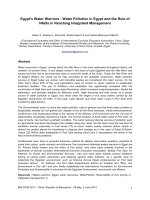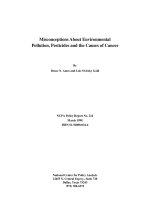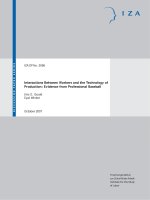- Trang chủ >>
- Khoa Học Tự Nhiên >>
- Vật lý
epistemology and the psychology of human judgment dec 2004
Bạn đang xem bản rút gọn của tài liệu. Xem và tải ngay bản đầy đủ của tài liệu tại đây (1.15 MB, 218 trang )
Epistemology and the Psychology
of Human Judgment
This page intentionally left blank
This page intentionally left blank
Epistemology and the Psychology
of Human Judgment
Michael A Bishop
J. D. Trout
1
2005
1
Oxford New York
Auckland Bangkok Buenos Aires Cape Town Chennai
Dar es Salaam Delhi Hong Kong Istanbul Karachi Kolkata
Kuala Lumpur Madrid Melbourne Mexico City Mumbai
Nairobi Sa
˜
o Paulo Shanghai Singapore Taipei Tokyo Toronto
Copyright # 2005 by Oxford University Press, Inc.
Published by Oxford University Press, Inc.
198 Madison Avenue, New York, New York 10016
www.oup.com
Oxford is a registered trademark of Oxford University Press
All rights reserved. No part of this publication may be reproduced,
stored in a retrieval system, or transmitted, in any form or by any means,
electronic, mechanical, photocopying, recording, or otherwise,
without the prior permission of Oxford University Press.
Library of Congress Cataloging-in-Publication Data
Bishop, Michael A
Epistemology and the psychology of human judgment / Michael A Bishop, J. D. Trout.
p. cm.
Includes bibliographical references and index.
ISBN 0-19-516229-3; 0-19-516230-7 (pbk.)
1. Judgment. I. Trout, J. D. II. Title.
BF441 .B616 2004
121—dc22 2004043889
987654321
Printed in the United States of America
on acid-free paper
To our wives, Loretta Torrago and Janice Nadler,
and to the veritable basketball team we produced while writing this book:
Miguel Bishop Torrago 7/5/2000
Daniel Bishop Torrago 9/26/2001
Nicolas Bishop Torrago 3/19/2003
Jack Nadler 7/5/2000
Jessie Nadler 4/14/2004
Miguel and Jack, our first children, were born on the same day. Our actuarial
outlook counsels that this is an unimpressive coincidence. But really, what are the
chances?
This page intentionally left blank
This page intentionally left blank
Preface
T
his book began in our classrooms. At some point, we discovered that
we both teach critical thinking courses that are idiosyncratic in the
same ways—in short, as though they are courses in the psychology of
judgment. For example, we both had our students read Robyn Dawes’s
House of Cards (1994) and Thomas Gilovich’s How We Know What Isn’t So
(1991). We independently arrived at the idea that there were episte mo-
logical lessons to be drawn not just from the heuristics and biases tradition
(which has received attention from philosophers) but also from the fas-
cinating research on linear predictive modeling. But we also recognized
that psychologists for too long had been wrestling with normative, epi-
stemic issues with much too little useful input from philosophers. In their
classic book Human Inference: Strategies and Shortcomings of Social Judg-
ment (1980), Richa rd Nisbett and Lee Ross call for greater participation
from philosophers in tackling the normative issues that arise in psychology.
[W]e have become increasingly aware of the difficulty of defining what is
‘‘normative’’ when one moves beyond the relatively simple question of how
to solve correctly some particular problem. ‘‘Normatively appropriate’’
strategies for the solution of some problems are extremely time consuming
and expensive. It may be clear what must be done if one wishes a correct
answer to such problems, but sometimes it may be even clearer that the
correct solution is not worth the effort. This gives rise to more important
questions of normativeness which are not fundamentally empirical in
nature: How much effort, for what kinds of problems, should be expended
to obtain a correct solution?
We have become excited by such normative questions and are pleased that
our book highlights them. We have not been able to make much progress
toward their solution, however. It is our hope that others, particularly
philosophers who are more comfortable with such questions, will be mo-
tivated to pursue them. (Nisbett and Ross 1980, 13–14)
It is rare for scientists to call on philosophers to contribute in substantive
ways to t heir scientific projects. Rarer still for scientists who are at the top
of their field.
Armed with the suspicio n that there was something useful for phi-
losophers to do in this area, we organized a symposium at the 2000 Phi-
losophy of Science Association meeting in Vancouver. The purpose of the
symposium was to explore the connections between research on predictive
modeling and philosophy (see Dawes 2002, Faust and Meehl 2002, Bishop
and Trout 2002). We have also presented these ideas to a number of
audiences at Bryn Mawr College, California State University at Long Beach,
Howard University, Northwestern University, University of Illinois, Uni-
versity of Innsbruck, University of Utah, and Washington University in St.
Louis. In almost every venue, there were philosophers whose reaction to
these issues was similar to our own: the normative issues raised by the
psychological literature are interesting and important, but analytic epis-
temology does not have the resources to adequately address them. So we sat
down to write this book.
Our goal in this book is to bring whatever philosophical expertise we
can to bear on the sorts of normative issues that bedevil psychologists (like
Nisbett and Ross). With a few notable exceptions, the normative concerns
of epistemologists and psychologists have inhabited different intellectual
worlds. When philosophers do discuss psychological findings, it is usually
to dismiss them as irrelevant to epistemology. This book will have achieved
its goals if it leads at least some philosophers and psychologists to admit
(even if ever so grudgingly) that their field of study would benefit from
closer cooperation with their sister discipline.
This book is the product of somewhat unusual philosophical training.
But then again, our philosophy teachers were an unusu al collection of
curiosity, talent, and trust. We are grateful to Richard Boyd, Philip
Kitcher, Robert Stalnaker, and Stephen Stich, each of w hom taught us in
his own way the value of pursuing interesting but risky projects. They also
encouraged us to explore issues that lie outs ide the disciplinary confines
of philosophy. In so doing, we were lucky to learn psychology, in grad-
uate school and after, from Frank Keil, Richard Nisbett, David Pisoni,
viii Preface
V. S. Ramachandran, Robert Remez, Roger Shepard, and Gary Wells.
These psychologists instilled in us an appreciation for a science of the
mind and (probably unwittingly) a recognition of its relevance to philo-
sophical questions.
Given our general outlook, we doubt that we can very reliably identify
the most important intellectual influences on our epistemological views.
But we are confident that they include Richard Boyd’s ‘‘Scientific Realism
and Naturalistic Epistemology’’ (1980), Alvin Goldman’s ‘‘Epistemics: The
Regulative Theory of Cognition’’ (1978) as well as Epistemology and Cog-
nition (1986), Philip Kitcher’s ‘‘The Naturalist’s Return’’ (1992) as well as
chapter 8 of The Advancement of Science (1993), Hilary Kornblith’s In-
ductive Inference and Its Natural Ground (1993), and Stephen Stich’s The
Fragmentation of Reason (1990).
For useful conversations about the material in this book, we would
like to thank our colleagues and friends: Paul Abela, Robert Baum, Travis
Butler, Douglas Epperson, Joe Kupfer, Dominic Murphy, Gary Pavela, Bill
Robinson, Abe Schwab, Peter Vranas, Daniel Weiskopf, and Gary Wells.
We would like especially to thank Joe Mendola, Michael Strevens, and
Mark Wunderlich, who gave us detai led comments on earlier drafts of this
book, and James Twine, who supplied excellent research assistance. We are
also grateful to the National Science Foundation for grants SES#0354536
(to MB) and SES#0327104 (to JDT) in support of the research culminating
in this book. The findings in Arkes (2003) should keep us modest.
Preface ix
This page intentionally left blank
This page intentionally left blank
Contents
Introduction 3
1. Laying Our Cards on the Table 6
2. The Amazing Success of Statistical
Prediction Rules 24
3. Extracting Epistemic Lessons from
Ameliorative Psychology 54
4. Strategic Reliabilism: Robust Reliability 71
5. Strategic Reliabilism: The Costs and Benefits
of Excellent Judgment 79
6. Strategic Reliabilism: Epistemic Significance 93
7. The Troubles with Standard Analytic
Epistemology 104
8. Putting Epistemology into Practic e: Normative
Disputes in Psychology 119
9. Putting Epistemology into Practic e:
Positive Advice 138
10. Conclusion 154
Appendix: Objections and Replies 159
References 187
Index 199
xii Contents
Epistemology and the Psychology
of Human Judgment
This page intentionally left blank
This page intentionally left blank
Introduction
T
he first three chapters of the book introduce the basic building blocks
of our epistemological approach and of our epistemological theory.
Chapter 1 introduces the basic motives and methods of our epistemology.
The goal is to give the reader a clear conception of our overall project. As a
result, the opening chapter is not weighed down with arguments and
qualifications—that comes later. Chapter 2 introduces Statistical Predic-
tion Rules (SPRs) and offers an explanation for their success. SPRs are
simple, formal rules that have been shown to be at least as reliable, and
typically more reliable, than the predictions of human experts on a wide va-
riety of problems. On the basis of testable results, psychology can make
normative recommendations about how we ought to reason. We dub the
branches of psychology that provide normative recommendations ‘‘Ame-
liorative Psychology.’’ Ameliorative Psychology recommends SPRs on the
basis of testable results: SPRs are reliable, they tend to be easy to use, and
they typically address significant issues. In addition, taking seriously the
success of SPRs requires us to impose discipline on a human mind that is
much too easily tempted by appealing distractions. Certain lin es of evi-
dence, no matter how subjectively attractive or how consecrated by the
concepts central to our epistemological tradition, are to be ignored except
in extreme cases. In chapter 3, we identify some of the basic building
blocks of the epistemological framework that supports the recommenda-
tions of Ameliorative Psychology. The framework assesses the epistemic
merit of reasoning strategies in terms of their robust reliability, their
feasibility and the significance of the problems they tackle. We then argue
that this framework offers a new way to think about applied epistemology.
In particular, it suggests that there are four and only four ways for people
to improve their reasoning.
The middle three chapters of the book (4, 5, and 6) articulate the
central feature s of our theory of epistemic excellence, Strategic Reliabilism.
Strategic Reliabilism holds that epistemic excellence involves the efficient
allocation of cognitive resources to robustly reliable reasoning strategies
applied to significant problems. Chapter 4 takes up what is the central
notion of Strategic Reliabilism: what it is for a reasoning strategy to be
robustly reliable. Chapter 5 defends a cost-benefit approach to episte-
mology and offers an account of what it is for cognitive resources to be
allocated efficiently. Chapter 6 argues that a genuinely normative episte-
mological theory must include some notion of significance, and it ad-
dresses the issue of what it is for a problem to be significant.
The final three substantive chapters of the book (7, 8, and 9) put our
views about epistemology to work. In chapter 7, we criticize the approach
that has dominated English-speaking philosophy over the past half-century
or so—what we call Standard Analytic Epistemology (SAE). SAE names a
contingently clustered set of me thods and motives. By comparing our
approach to that of SAE, chapter 7 identifies some of the troubles with
SAE and argues that they are serious enough to motivate a radically dif-
ferent approach to epistemology. Chapter 8 takes Strategic Reliabilism,
which has been extracted from psychology, and turns it back on psychol-
ogy. We use Strategic Reliabilism to resolve two debates about whether
certain experimental findings demonstrate deep and systematic failures of
human reasoning. This chapter illustrates one of the main benefits of our
approach to epistemology: it can be used to adjudicate disputes that arise
in psychology that are, at bottom, normative epistemological disputes
about the nature of good reasoning. Chapter 9 attempts to consolidate
some of the lessons of Ameliorative Psychology with some handy heu-
ristics and illustrative injunctions. We explore the empirical research that
shows how we can enhance the accuracy of diagnostic reasoning, reduce
overconfidence, avoid the regression fallacy, improve our policy assess-
ments, and restrain the unbridled story-telling surrounding rare or un-
usual events. We have no doubt that many significant problems we face
are best addressed with institutional measures, and on this issue much
research remains to be done. But for those problems tractable to voluntary
reasoning strategies, the simple strategies recommended in this chapter
can improve reasoning at low cost and high fidelity.
4 Introduction
Chapter 10 briefly sums up our view and points to some of the
challenges that remain in the construction of a naturali stic epistemology.
The Appendix considers 11 objections that we expect philosophers to
level against our views. Some will undoubtedly complain that we have
missed some serious objections, or that our replies to the objections we
do consider are by no means conclusive. Granted. But our goal in the
Appendix is not the wildly ambitious one of overcoming all serious ob-
jections. Instead, our aim is to offer some sense of the resources available
to the naturalist for overcoming what many proponents of SAE are likely
to consider devastating objections.
Introduction 5
1
Laying Our Cards
on the Table
I
t is time for epistemology to take its rightful place alongside ethics as a
discipline that offers practical, real-world recommendations for living.
In our society, the powerful are at least sometimes asked to provide a
moral justification for their actions. And there is at least sometimes a
heavy price to be paid when a person, particularly an elected official, is
caught engaging in immoral actions or defending clearly immoral policies.
But our society hands out few sanctions to those who promote and defend
policies supported by appallingly weak reasoning. Too often, condemna-
tion is meted out only after the policies have been implemented and have
led to horrible results: irresponsible war and spilt blood or the needless
ruin of people’s prospects and opportunities.
Epistemology is a serious business for at least two reasons. First, epis-
temology guides reasoning, and we reason about everything. If one embraces
a defective morality, one’s ability to act ethically is compromised. But if one
embraces a defective epistemology, one’s ability to act effectively in all areas
of life is compromised. Second, people don’t fully appreciate the risks and
dangers of poor reasoning. Everyone knows the danger of intentional evil;
but few fully appreciate the real risks and untold damage wrought by
apparently upstanding folk who embrace and act on bad epistemological
principles. Such people don’t look dangerous. But they are. An example of
the costs of upstanding people reasoning poorly is the surprisingly strong
opposition in the United States to policies that would provide opportu-
nities and services to the disadvantaged (e.g., in terms of education and
basic needs such as health care). Much of this opposition is not based on
the rejection of a moral principle of equal opportunity, but instead on
poorly-arrived-at empirical views. Some people reject redistributive social
policies on the grounds that they are inevitably ineffective; others rely on
clearly mistaken views about what percentage of the federal budget actually
goes to pay for such programs. That’s not to say that there aren’t good
arguments against some redistributive policies. Some can backfire, and
others (particularly those that benefit the non-poor) can be very expensive.
But sound comparative policy analysis provides no support to a principled
opposition to redistributive so cial policies. People who defend appalling
social policies often do so on the basis of weak reasoning about factual
matters rather than on the basis of backward moral precepts.
One might think that our call for a more prescriptive, reason-guiding
epistemology is more appropriate for the areas of ‘‘critical thinking’’ or
‘‘informal logic’’ (Feldman 1999, 184–85, n10). The problem with this
suggestion is that these areas, as exemplified in textbooks, are completely
divorced from contemporary epistemology. This bespeaks deep problems
both for critical thinking courses and for contemporary epistemology.
Epistemology, if it is to achieve its normative potential, must make firm
contact with the sorts of reasoning errors that lead to horrendous and
avoidable outcomes. And critical thinking courses must be informed by a
theory about what makes reasoning good or bad. We do not have in mind
a thin epistemological ‘‘theory’’ (e.g., ‘‘premises should be true and sup-
port the conclusion’’) that yields a long list of informal fallacies. Rather, an
effective critical thinking course should be informed by a theory that
(among other things) helps us to recognize, anticipate, and compensate
for our cognitive frailties. In other words, such courses should be in-
formed by a deeply naturalistic epistemological theory.
We have written this book driven by a vision of what epistemology
could be—normatively reason guiding and genuinely capable of be nefiting
the world. If our tone is not always dispassionate, it is because our pro-
fession has so clearly failed to bring the potential benefits of epistemology
to ordinary people’s lives. We are under no illusions, however. This book
is, at best, a modest first step toward the construction of an epistemo-
logical theory with concrete, prescriptive bite. And even if our theory
should be somewhere close to the truth, we are not sanguine about the
potential of philosophy to influence the world. Sometimes, though, life
rewards wild-eyed optimists. If in our case it doesn’t, we fall squarely
within what is best in our philosophical tradition if our reach should
exceed our gras p.
Laying Our Cards on the Table 7
1. Starting points: What epistemology
is about
Theories, including epistemological theories, are supposed to be about
something. They are supposed to explain or account for some range of phe-
nomena. An important way in which our approach to epistemology differs
from that of most contemporary English-speaking epistemologists is in
terms of what we take to be the proper subject matter of epistemology—
what we take to be the phenomena or evidence that an epistemological
theory is supposed to account for or explain. Traditional epistemological
theories aim to provide a theory that captures our considered epistemic
judgments, in particular, our considered judgments about knowledge and
justification. Our epistemological theory aims to uncover the normative as-
sumptions of a branch of science. We disagree with most traditional
epistemologists in terms of what epistemology is about. This difference
couldn’t be more fundamental.
1.1. The starting point of the standard analytic
approach to epistemology
Standard Analytic Epistemology (SAE) names a contingently clustered class
of methods and theses that have dominated English-speaking epistemology
for much of the past century. Almost all the contemporary readings in the
most popular epistemology textbooks are prime examples of SAE. Con-
temporary versions of foundationalism, coherentism, and reliabilism are
exemplars of SAE. While we object to the methods of SAE, and therefore to
the kinds of theories it leads to, our main goal in this chapter is to distin-
guish our approach from that of SAE. So let’s begin with the starting points
of SAE—what proponents of SAE take to be the fundamental phenomena
or evidence of epistemology.
The goal of most philosophers engaged in SAE is to provide an account
of knowledge and epistemic justification. What are the success conditions on
such an account? In a typically clear and careful article, Jaegwon Kim
identifies a number of criteria that any account of justification must meet
in order to be successful. The most important of these conditions is what
we will call the stasis requirement:
Although some philosophers have been willing to swallow skepticism just
because what we regard as correct criteria of justified belief are seen to lead
inexorably to the conclusion that none, or very few, of our beliefs are
8 Epistemology and the Psychology of Human Judgment
justified, the usual presumption is that our answer to the first question
[What conditions must a belief meet if we are justified in accepting it as
true?] should leave our epistemic situation largely unchanged. That is to say,
it is expected to turn out that according to the criteria of justified belief we
come to accept, we know, or are justified in believing, pretty much what we
reflectively think we know or are entitled to believe. (Kim 1988, 382)
It is worth noting that this requirement—that the right account of justi-
fication ‘‘leave our epistemic situation largely unchanged’’—is profoundly
conservative. In particular, it is extraordinary that SAE should have built
right into it a requirement that makes it virtually impossible that a suc-
cessful epistemological theory would force us to radically alter our epi-
stemic judgments.
Of course, proponents of SAE will not suggest that they are trying to
provide an account of their naı
¨
ve epistemic judgments, but of their con-
sidered epistemic judgments. One way to spell out the difference is in terms
of reflective equilibrium. Nelson Goodman introduced reflective equilib-
rium as a process that involves aligning our judgm ents about particular
instances with our judgments about general principles. ‘‘The process of
justification is the delicate one of making mutual adjustments between
rules and accepted inferences; and in the agreement achieved lies the only
justification needed for either’’ (1965, 64). Narrow reflective equilibrium is
the process of bringing our normative judgments about particular cases
into line with our general normative prescriptions and vice versa. Wide
reflective equilibrium differs from narrow reflective equilibrium by in-
cluding our best theories in the mix. So wide reflective equilibrium is the
process of bringing into alignm ent our best theories, as well as our nor-
mative judgments about particular cases, and our general normative pre-
scriptions (Rawls 1971, Daniels 1979).
So according to the stasis requirement, if an epistemic theory forced us
to radically alter our considered epistemic judgments (e.g., our epistemic
judgments in reflective equilibrium), then ipso facto that theory is unac-
ceptable. While some proponents of SAE might reject the stasis require-
ment (e.g., Unger 1984), we agree with Kim that stasi s is a fundamental
commitment of SAE. It is not, however, often explicitly stated. That is
because the commitment to epistemic stasis is implicit in the practice of
SAE. Much of SAE proceeds by counterexample philosophy: Someone
proposes an account of justification, others propose counterexamples, and
then the original account is altered or defended in the face of those
counterexamples. What we find objectionable about this mode of argument
is what proponents of SAE accept as a successful counterexample. To see
Laying Our Cards on the Table 9
this, let’s consider the mother-of-all counterexamples in SAE, the Gettier
Problem.
Before Gettier, it was generally thought that knowledge is justified
true belief (JTB). Gettier (1963) describes a situation in which the JTB
account is at odds with our considered knowledge judgments. One of
Gettier’s famous cases involves a man named Smith who has overwhelm-
ing evidence, and so justification, for believing that Jones will get a job and
that Jones has ten coins in his pocket. On the basis of these beliefs, Smith
infers that the man who will get the job has ten coins in his pocket. It turns
out that unbeknownst to Smith, he will get the job, and he has ten coins in
his pocket. His belief that the man who will get the job has ten coins in his
pocket is true and justified. But Gettier insists that it is ‘‘clear’’ that
Smith’s belief is not knowledge (Gettier 1963, 122). For proponents of
SAE, the Gettier examples are important because they show that the JTB
account can’t be right on the grounds that it does not ‘‘leave our episte-
mic situation largely unchanged.’’ Rather than explore any more of the
countless and wonderfully rococo counterexamples prevalent in the SAE
literature, let’s look at how some of these counterexamples end:
However, it is perfectly apparent that I know nothing of the sort. (Lehrer
and Paxson 1969, 235)
Even if S correctly predicts that he is going to lose, we would deny that he
knew he was going to lose if the only basis he had for this belief was the fact
that his chances of winning were so slight. (Dretske 1971, 3)
The situation is a peculiar one, and my intuitions, and I would suppose other
people’s, are not completely clear on the matter. But it seems, on the whole,
that we ought not to speak of knowledge here. (Armstrong 1973, 181)
But, to make such an assumption is counterintuitive. In everyday situations
we do not regard deception as precluding rationality. Likewise, we do not
regard the fact that we have been deceived, or will be deceived, or would be
deceived, as precluding rationality. (Foley 1985, 192)
And, surely, we do not want to say that the fact that his friend has a
generator in his basement prevents S from having knowledge that the
company’s generators are causing the lights to be on. (Pappas and Swain
1973, 66)
In the above passages (and we could have chosen literally hundreds of
others), we are urged to share the philosopher’s considered epistemic judg-
ments about some imagined scenario. And we usually do. The problem,
10 Epistemology and the Psychology of Human Judgment
on our view, is that SAE rejects various accounts solely on the grounds that
they violate these judgments.
The shockingly conservative nature of the method of SAE may only
become clear when we compare it to methods in other fields of inquiry.
The fact that relativity denies people’s considered judgments about si-
multaneity is hardly a reason to reject it. If physics had been burdened
with such a conservative method, w e wouldn’t have relativity, quantum
mechanics (or perhaps even Copernicanism!). If biology had been taken
over by such a conserva tive method, we wouldn’t have Darwinism. If
cultural studies had had such a conservative method, we wouldn’t have
postmodernism.
Okay, so sometimes conservatism is a good thing.
Behind this joke is an important point. The problem with conservative
methods is not that they are conservative per se. Conserva tive methods
work very well when applied to theories or propositions for which we have
overwhelming evidence. It is perf ectly reasonable to be conservative about
the commitments of theoretical chemistry reflected in the periodic table, or
about the core attachments of contemporary physics or biology. That
doesn’t mean we rule out the possibility that new developments will force
us to abandon them. Conservatism isn’t mulishness. Conservatism is ap-
propriate in the case of the core commitments of these theories because we
have so much evidence in their favor that in absence of extraordinary
counterevidence, they deserve our allegiance. But while conservatism is fine
for excellent theories, it is poison in domains where progress awaits deep
and durable changes in method and outlook. The alchemist’s attachment to
conservatism was ill advised; it only protracted the alchemist’s crippling
(and it turns out, thanks to mercury and lead, fatal) ignorance. This raises
an obvious concern for SAE, which we w ill explore more fully in chapter 7.
No matter how polished or well thought-out our epistemic judgments, no
matter how much in reflective equilibrium they might be, are we so con-
fident in them that it is reasonable to make them the final arbiters of our
epistemological theories?
1.2. The starting point of the philosophy of science
approach to epistemology
We view epistemology as a branch of the philosophy of science. From our
perspective, epistemology begins with a branch of cognitive science that
investigates good reasoning. It includes work in psychology, statistics,
Laying Our Cards on the Table 11
machine learning, and Artificial Intelligence. Some of this work involves
‘‘predictive modeling,’’ and it includes discussion of models such as linear
models, multiple regression formulas, neural networks, naı
¨
ve Bayes clas-
sifiers, Markov Chain Monte Carlo algorithms, decision tree models, and
support vector machines; but much of this work comes from traditional
psychology and includes the well-known heuristics and biases program
launched by Kahneman and Tversky (Kahneman, Slovic, and Tversky
1982). It will be useful to give this wide-ranging literature a name. We call
it Ameliorative Psychology. The essential feature of Ameliorative Psychol-
ogy is that it aims to give positive advice about how we can reason better.
We will introduce many findings of Ameliorative Psychology (particularly
in chapters 2 and 9). But it will be useful here to introdu ce some of its
noteworthy features.
In the course of this book, we will introduce a number of reason-
guiding prescriptions offered by Ameliorative Psychology. This advice
includes making statistical judgments in terms of frequencies rather than
probabilities, considering explanations for propositions one doesn’t be-
lieve, ignoring certain kinds of evidence (e.g ., certain selected cues that
improve accuracy only very moderately, and certain kinds of impression-
istic information , such as opinions gleaned from unstructured personal
interviews), and many others (Bishop 2000). These recommendations are
bluntly normative: They tell us how we ought to reason about certain sorts
of problems.
A particularly interesting branch of Ameliorative Psychology begins in
earnest in 1954 with the publication of Paul Meehl’s classic book Clinical
Versus Statistical Prediction: A Theoretical Analysis and a Review of the
Evidence. Meehl reported on twenty experiments that showed that very
simple prediction rules were more reliable predictors than human experts.
Since then, psychologists have developed many of these Statistical Pre-
diction Rules (or SPRs). (In fact, in the past decade or so, there has been
an explosion of predictive models in AI and machine learning.) There is
now considerable evidence for what we call The Golden Rule of Predictive
Modeling: When based on the same evidence, the predictions of SPRs are
at least as reliable, and are typically more reliable, than t he predictions
of human experts. Except for an important qualification we will discuss
in chapter 2, section 4.2, the evidence in favor of the Golden Rule is
overwhelming (see Grove and Meehl 1996; Swets, Dawes, and Monahan
2000).
The Golden Rule of Predictive Modeling has been woefully neglected.
Perhaps a good way to begin to undo this state of affairs is to briefly
12 Epistemology and the Psychology of Human Judgment









